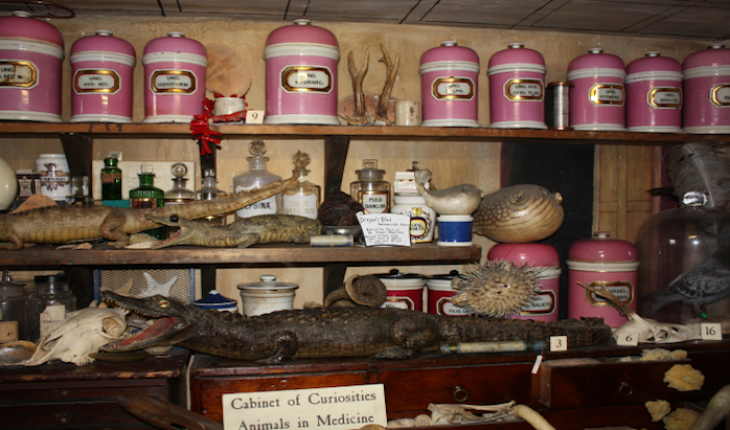The Worshipful Society of Apothecaries sounds like some relic of a bygone time. But this City of London livery society is not only a member of the London Museums of Health & Medicine, but is also an active and innovative medical association.
When someone was ill in olden times, rather than find an expensive physician they would probably approach an apothecary, who would diagnose the ailment, prescribe the remedy and sell the appropriate medication. The Society was incorporated back in 1617 in recognition of apothecaries’ specialist skills in compounding and dispensing medicines. Before that, apothecaries were in the Grocers’ Company (founded 1345) and before that in the Guild of Pepperers (founded before 1180). Apothecaries were, however, untrained and unregulated, with the freedom to deal with quack remedies and patent medicines.
The Apothecaries’ Hall in Blackfriars (built in 1668 following its predecessor’s destruction in the Great Fire of London) was restored after slight damage in 1940. The Society’s membership is unlimited and currently stands at over 1600, making it the largest of the livery organisations.
The Society is number 58 in the City’s pecking order and has been licensing doctors to practise medicine since 1815. It used to do so through its membership of the now defunct United Examining Board. 85% of its members must have achieved a medical or pharmacist’s qualifications registrable with either the General Medical or Pharmaceutical Council, respectively.
Its qualifications in vital areas of medicine not covered elsewhere are via two Faculties: the History and Philosophy of Medicine; and Pharmacy and Conflict.
An example of its postgraduate diplomas that are relevant to the current millions of refugees worldwide is the Society’s expertise in Medical Care in Catastrophes; this is an essential requirement for British (and other) medical officers. And its diploma in HIV is required for all NHS consultants seeking to specialise in this field. Such qualifications (some being the first of their kind in the world) are at the highest standards of medical learning.
Notable apothecaries include the romantic poet Keats, the suffragette Elizabeth Garrett Anderson – the first woman to qualify as a medical practitioner, and Sir Ronald Ross – the first British Nobel Laureate and controversial polymath (it was he who first determined that malaria was transmitted by mosquitoes).
How do apothecaries align with pharmacists (the UK uses the term chemist, the US and some others refer to druggists)? They also have to be registered with the General Pharmaceutical Council, and are experts in medicine, using their clinical expertise to advise families or other healthcare professionals on the most effective treatments for a particular condition – even those for sale without prescription. When ready-made preparations are not available, they are involved in manufacturing medicines.
Nicholas Culpeper (1616-54) was dedicated to serving the sick and wrote and translated many medical books. His biggest success was what is now known as Culpeper’s Herbal (the herbal remedies of folk medicine include many medically useful ingredients).
The 20th century saw drugs being prepared in laboratories; chemist shops took over the retail aspect of selling medicine; and production was increasingly industrialised.
The global pharmaceutical industry generates annual revenues of over $1 trillion with high-profit margins. The largest organisation is Johnson & Johnson in the States, with annual revenue of $74 billion and more than 250 subsidiaries in over 57 countries. They pioneered the first commercial first aid kits and were the first to produce sanitary products for women.
Big Pharma is the nickname for that vast industry and its trade group. A long way but not separate from the apothecaries of yore.
- Autism: Puberty and sexuality - 4th September 2020
- Update on Autistica - 7th May 2019
- Autistica’s Discover Network - 7th December 2018







